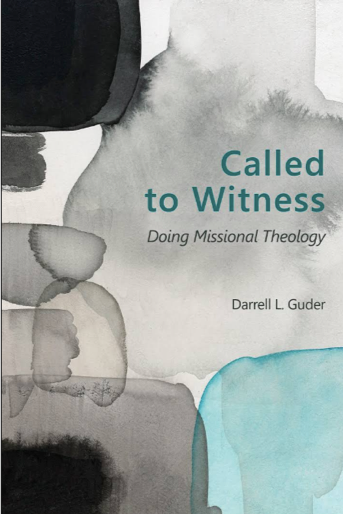
Called to Witness: Doing Missional Theology
By Darrell L Guder
Reviewed by Darren Cronshaw
(The Gospel and our Culture Series. Grand Rapids, MI: Eerdmans, 2015. xvi+203p.ISBN 978-0-8028-7222-7)
How we understand the identity of the church, the study of theology, the task of theological education and the calling of leadership are critical theological questions. An emerging ecumenical consensus is that the best way to answer these questions in a post-Christendom context is from the perspective of mission. This is the contribution of missional theology.
Darrell Guder is Henry Winters Luce Professor Emeritus of Missional and Ecumenical Theology at Princeton Theological Seminary. As a thought leader in the Gospel and our Culture Network and author of Missional Church and The Continuing Conversion of the Church, Guder is among the most influential North American missional theologians of the last two decades. His writing serves as ‘a gadfly in the house of theology’, as David Bosch said missiology should, ‘creating unrest and resisting complacency’.Called to Witness compiles eleven of Guder’s essays on missional theology, dating from 2002 to 2013.
The chapters were written for different contexts and so offer the reader snapshots of conversations and debates more than a cohesive whole. But this forms a benchmark of missional theology and an insightful overview of the history of missional church, missional theology and missional leadership formation. Guder suggests the underlying theme of the volume is ‘Trinitarian missiocentricity’.
Throughout the book Guder underlines and explores the implications of moving from church centred mission to mission centred church; from church with mission to missional church; from theology with a mission component to mission theology and missional theology; and from an ecclesiocentric understanding of mission shaped by Christendom to a theocentric and especially Trinitarian understanding of mission for all of creation. These transitions are especially important in a context where European Christendom is over but still governs ecclesial imaginations. Building on Karl Barth as the missional theologian who reminded us of our calling to witness, and on Newbigin and his appeal for congregations to be ‘the hermeneutics of the Gospel’, Guder points in practical directions for how to grow into this missional vocation.
Guder elevates the importance of missional hermeneutics in reading Scripture – asking how a text helped form witnessing communities then, and still now? And he upholds the importance of missional ecumenism, and how missio Dei and the common task of mission is drawing churches together rather than any push for doctrinal unity. Guder critiques colonial approaches to mission – throughout Christendom but also today when Western churches presume superiority over Majority world sister churches. He also shows historical nuance in affirming the Spirit’s work through the church in that ambiguous period of history we call Christendom, albeit with its limited mission theology.
I especially appreciated Guder discussing how seminaries prepare missional leaders who equip communities for their ‘worthy walk’ of witness. The task is not educating priests, pedagogues or professionals who supply the saints with what they need for individual salvation but forming leaders who can equip the saints; i.e. mission not maintenance. Ultimately, the focus is not on the qualities of graduates but the witnessing communities who they form. How can we foster conversion into this kind of missional vocation, so that congregations become parables of the Kingdom of God? Patterns of missional leadership, Guder suggests, must include collegial teams, discipleship to prepare the apostolate, and engaging Scripture to be equipped for mission:
‘We have to risk unchaining the Bible, risk real biblical literacy in our communities rather than dependence upon the learned few, and risk the freewheeling conversation about what the Spirit is really saying to the churches.’ (p151)
This challenge of reshaping the theological curriculum for the church’s missional vocation rather than accepting gospel reductionisms and cultural captivity is the resounding challenge of Called to Witness. It will be valuable for mission practitioners and teachers, especially those interested in missional theology and training.
A shorter version of this review was originally published in Exchange: Journal of Missiological and Ecumenical Research 47 (2018), 406-407.
